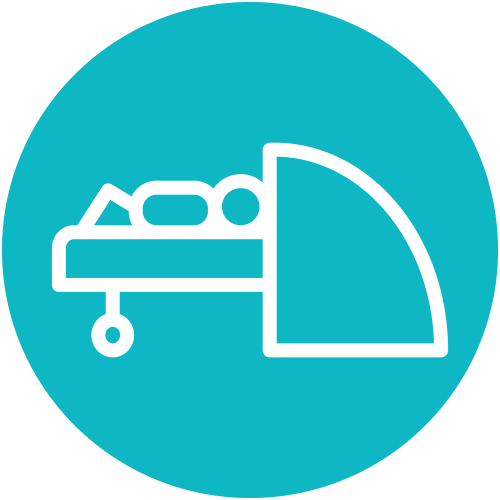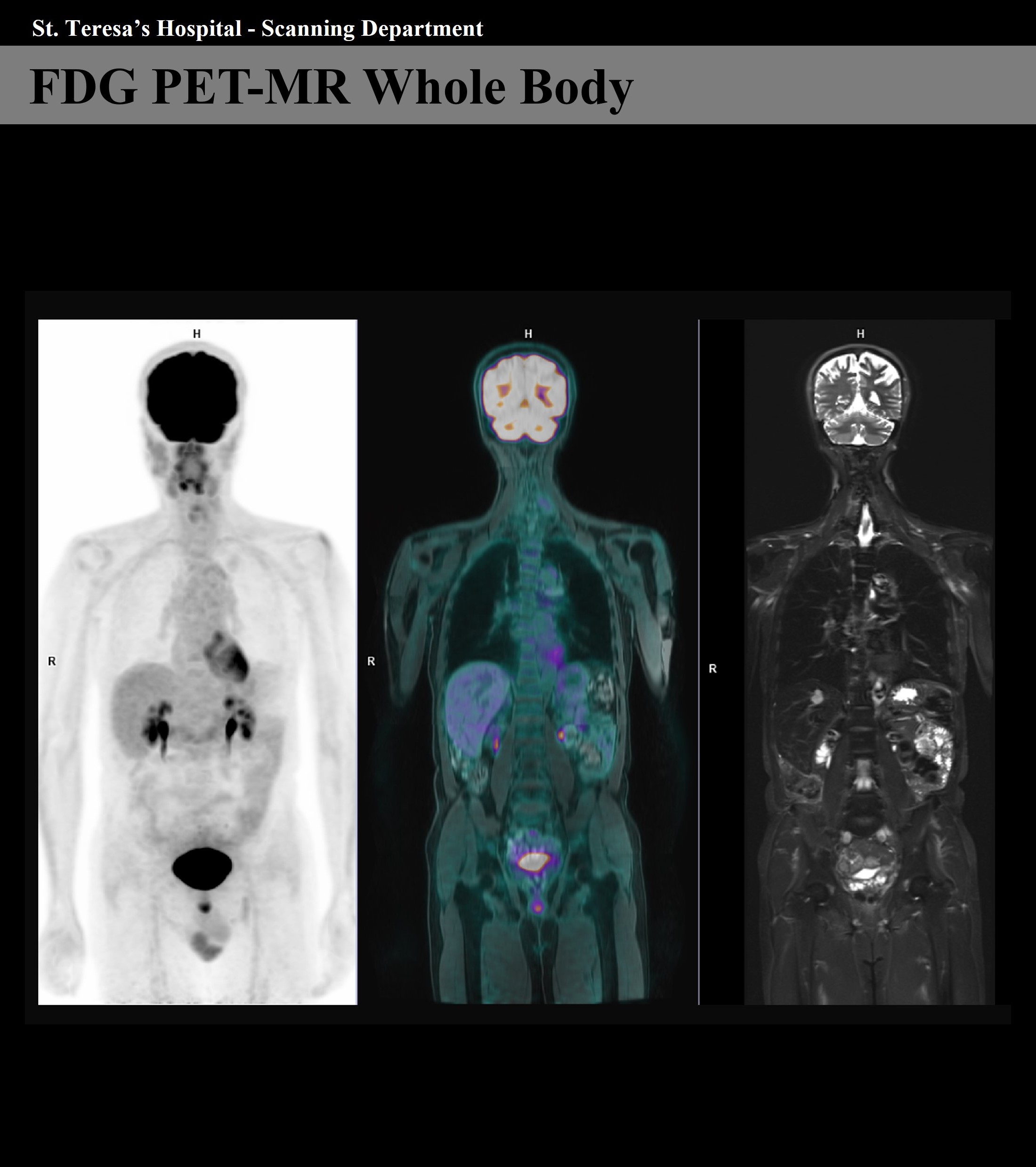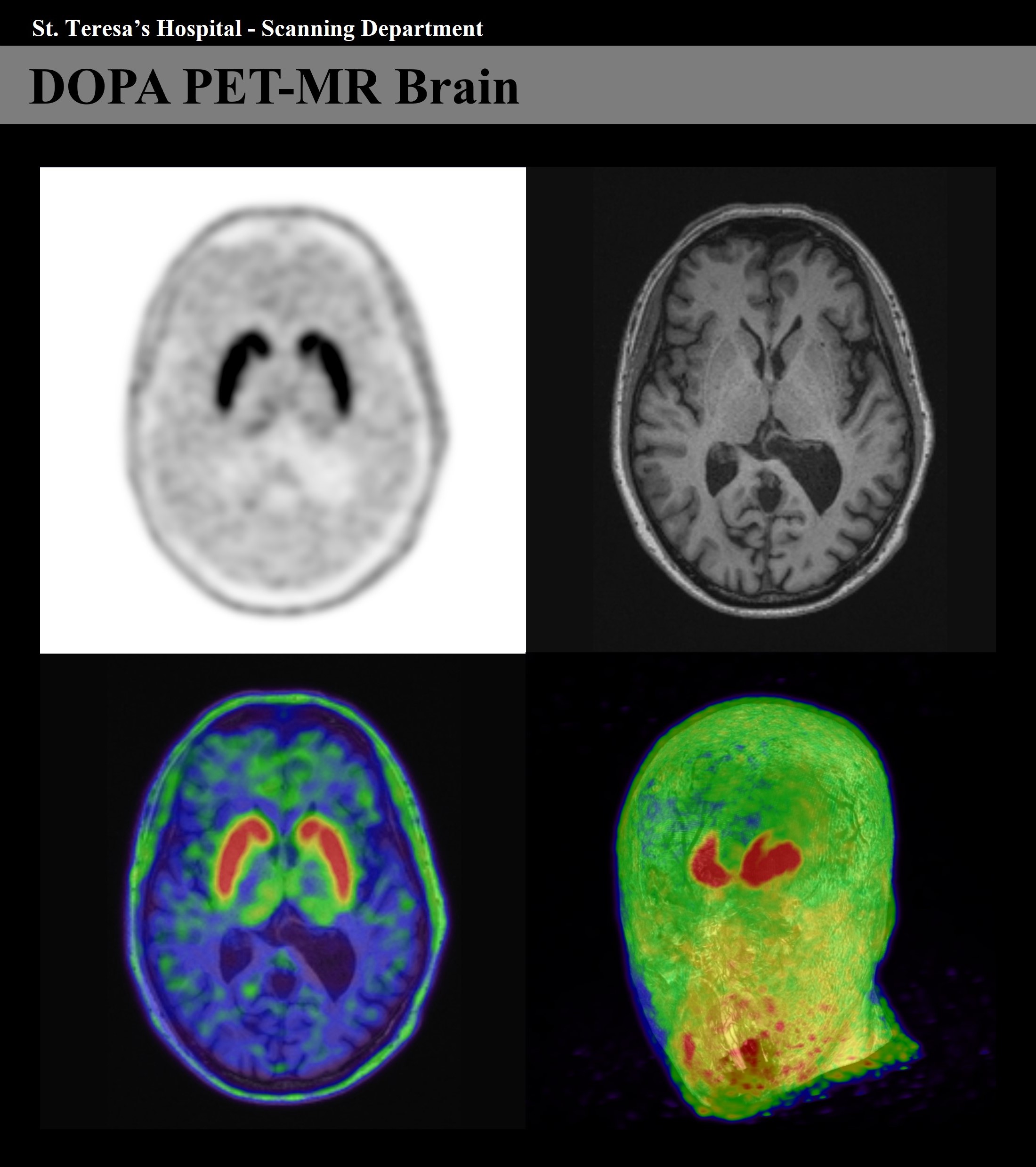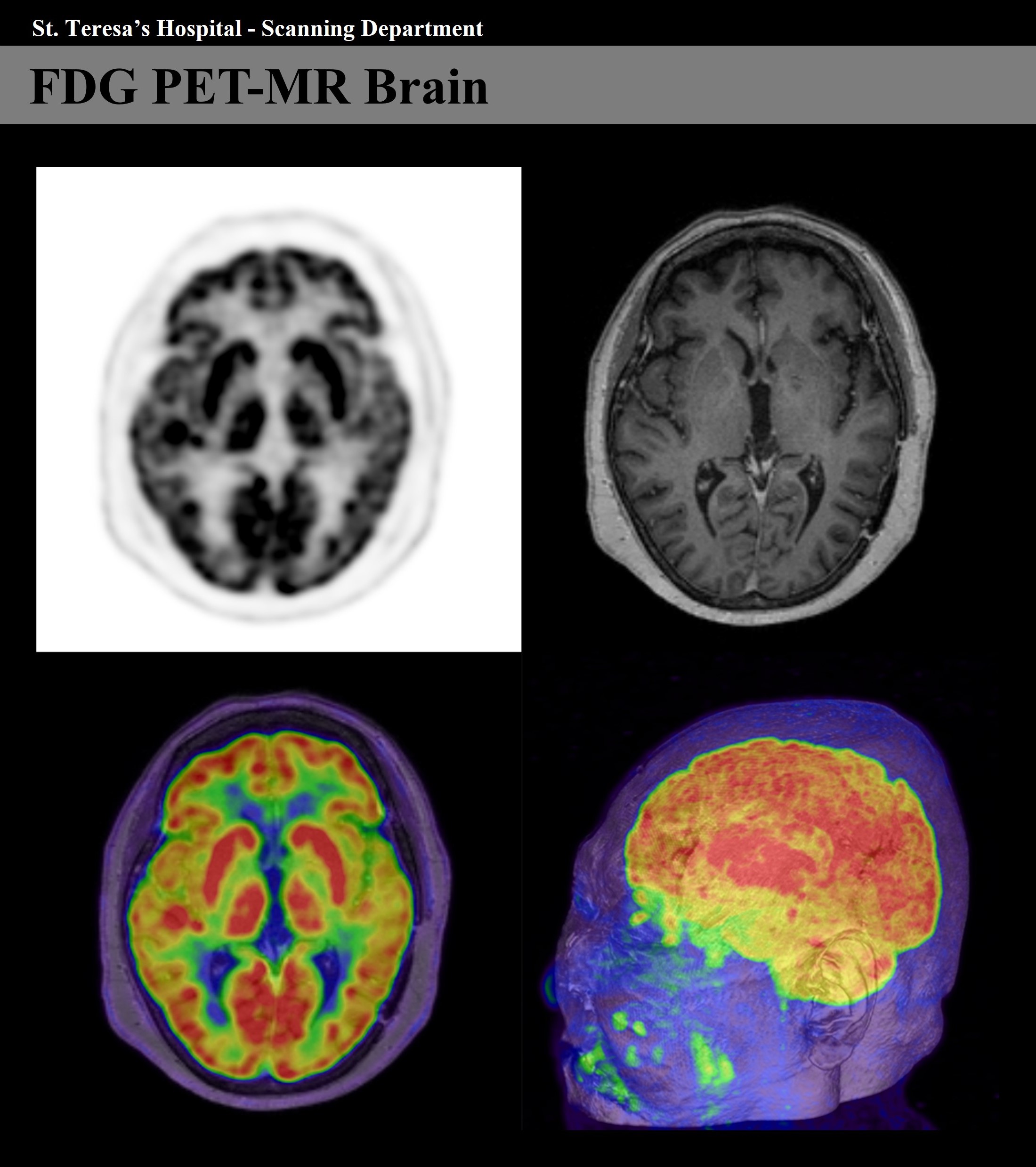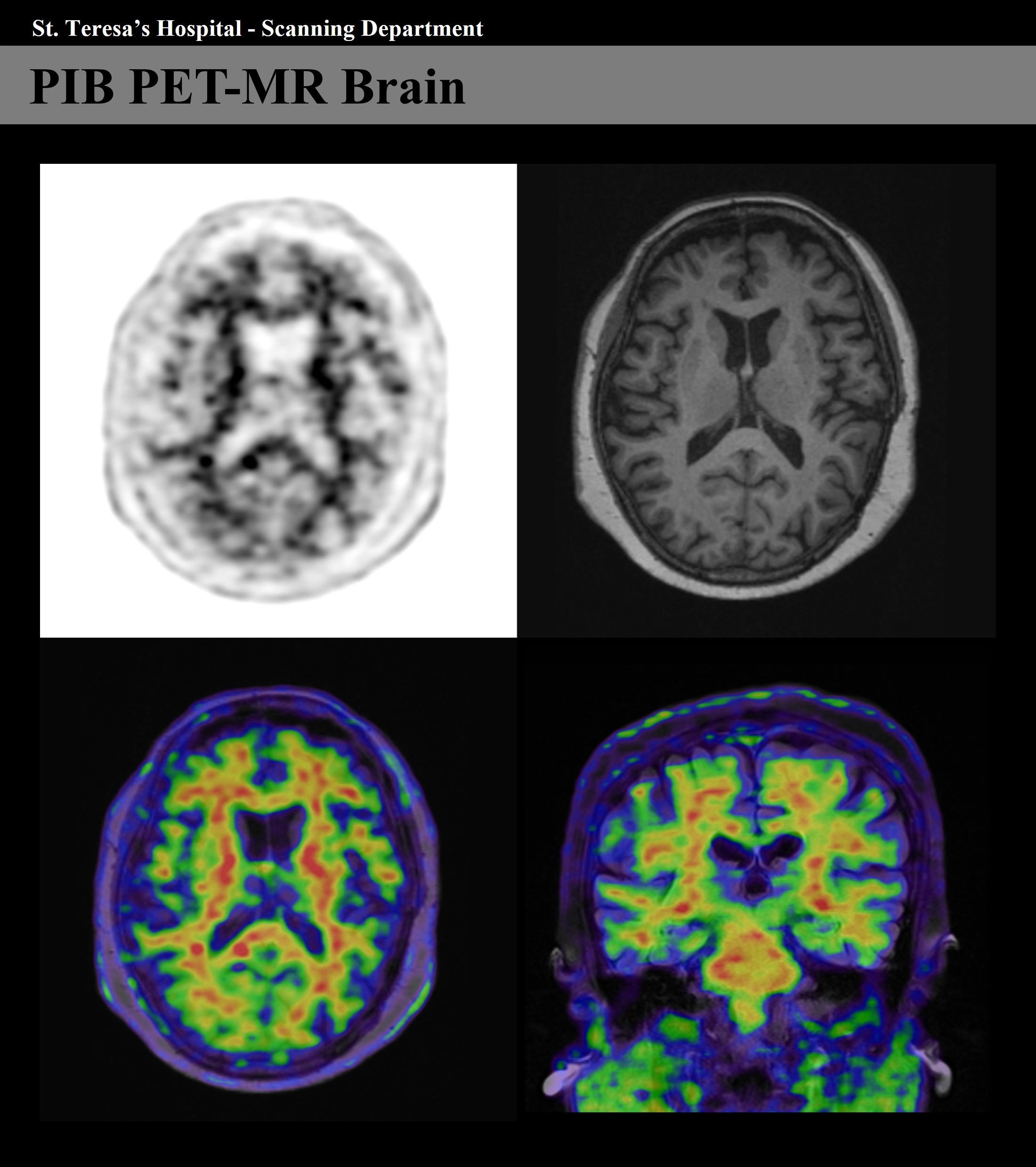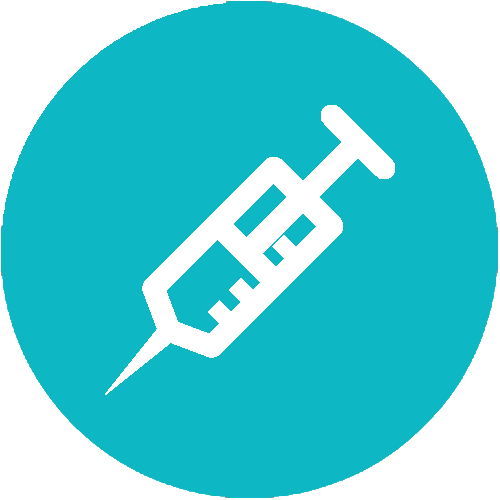PET-MR
What is Positron Emission Tomography – Magnetic Resonance Imaging (PET-MR)?
PET-MR is an innovative hybrid imaging technique that combines the molecular imaging capability of PET with the superb, radiation-free anatomical correlation of MR in one system.
Why is PET-MR useful?
- High soft tissue contrast resolution for oncologic disease.
- Reduces at least 50% of total radiation exposure by obviating the need for CT.
- Better patient experience through simultaneous PET and MRI scans in one system.
- Facilitates assessment of Alzheimer’s and other neurodegenerative diseases.
Benefiting From Our Legacy
The practice of clinical PET-MR not only requires sub-specialized expertise in both PET and MR imaging but also trained technologists competent in respective modalities. This challenging task is accomplished through seamless collaboration between our experienced Nuclear Medicine (NM) team which has provided PET services since 2000, and our expert Magnetic Resonance (MR) team which has been pioneering clinical MR in Hong Kong since 1989 under the leadership of Dr. Hector Ma.
PET-MR • Preparation & Procedure
Preparation & Procedure vary in different examination. Please contact our staff for details.
Below information applies to exam of Whole Body PET-MR Scan (F18-FDG) only.
PATIENT INFORMATION FOR PET-MR EXAM
General Information
- Female patient should not be pregnant.
- Fasting for 4 hours before exam, but keep well hydrated with plain water.
- No dextrose drip 6 hours before scan.
- No vigorous exercise the day before exam.
- Stop Chinese medicine (e.g. Ling Zhi, Yun Zhi) 3 days before the exam.
- Do not wear eye make-up, colored or cosmetic contact lenses.
- For diabetes patient, please inform our staff when making appointment. Kindly stop medications in the exam morning and bring along the medication to the exam.
- Please inform your doctor and our staff when making appointment for special exam arrangement:
- If you have any metallic implants or prosthesis e.g. cardiac pacemaker.
- If you are claustrophobic.
- The whole process of the exam takes about 3-4 hours.
Information for exam with contrast injection
- Please inform your doctor and our staff if you have allergic history to gadolinium MRI contrast. Steroid cover before exam may be advised.
- If the exam requires patient to receive multiple doses of gadolinium MRI contrast, blood creatinine level should be checked within 2 weeks before exam.
Information for female of childbearing age
- Please inform your doctor and our staff if you are/may be pregnant or if you are breast-feeding before the exam.
- The date of your last menstrual period (LMP) will be asked for our record.
Information for infants / children (who require medication for sedation)
- Wake them up early on the day of exam.
- Please keep them awake 4 hours before exam.
- Fasting for 4 hours (except water) before exam (skipping 1 meal for infants).
Information for patients under the age of 18
- Need to be accompanied by parent or legal guardian for examination.
- The written consent form must be signed by parent or legal guardian.
- Please bring patient’s birth certificate or relevant identification document for registration.
REGISTRATION
- Arrive at Scanning Department at appointment schedule.
- Present the following documents to Front Desk for registration.
- Doctor’s referral letter
- Appointment Sheet (if any)
- Identification document, e.g. HKID card
- Previous imaging reports, DVDs and films (except those examinations completed in Scanning Department)
BEFORE PET-MR SCAN
- Meet our nurse / radiographer to review medical history and explain procedures and complete safety checklist e.g. any metallic implant or prosthesis, etc.
- Get changed into hospital gown and take off all personal possessions (e.g. watches, jewellery, hairpins, mobile phones, etc.).
- Take measurements of body weight/height, fasting blood glucose level and vital signs.
- If fasting blood glucose level is too high, we will inject insulin according to doctor’s instruction and re-check the level until it drops to acceptable range. (If fasting blood glucose level is extremely high, exam may be rescheduled until it is well controlled.)
- Inject radioactive isotope.
- Rest in uptake room for 60-90 mins for isotope uptakes and drink about one liter of water during rest.
DURING PET-MR SCAN
- Entire scanning procedure is conducted by our well-trained radiographers.
- Put on earplugs / headphone given by our staff to minimize the noise during the scan.
- Lie on the scanner table and stay still throughout the exam.
- The table carries you slowly into the scanner gantry.
- Intercom system and call bell are available for communication.
- Intravenous contrast medium may be given if needed.
- Exam takes about 45 mins.
AFTER PET-MR SCAN
- Radiologist checks the images of the scan and decides if delayed scan is required.
- If intravenous contrast is given in the exam, you may be asked to stay for about 20 mins upon completion of all scanning for any adverse reactions.
- Resume your usual diet and activities thereafter unless your doctor advises you differently.
REPORT & FINDINGS
- Our radiologists interpret the images and issue an imaging report to your referring doctor.
- Your referring doctor explains the findings and diagnosis to you.
PET-MR • FAQ
Q: Are there any side effects after injection of radioactive isotope for a PET-MR scan?
A: PET-MR examinations involve injection of radioactive isotope. The radiation dose is small and will not affect your body function or cause discomfort during the procedure. Besides, the residual radiation inside your body will diminish through natural half-life decay. You will be encouraged to drink plenty of water after the examination to facilitate the excretion of radioactivity. You can get rid of radiation usually within a few hours. You can then resume all daily activities. Avoidance of unnecessary contact with pregnant women and infants on the day of examination is suggested.
Q: How is PET-MR examination different to a PET-CT examination plus an MRI examination?
A: In order to bring personalized medicine to our patients, we tailor PET acquisition and MR imaging sequences to the clinical question of individual patient through careful combination of whole-body and regional PET-MR imaging. Our goal is to maximize diagnostic accuracy with the most appropriate multi-parametric PET-MR evaluation while enhancing patient acceptance with optimized image acquisition time by simultaneous hybrid scan.
Q: Do I need contrast injection for a PET-MR examination?
A: Depending on the examination requested by your doctor and the clinical indications, you may be required to have contrast medium injection for more information. Our staff will discuss with you before a contrast enhanced study.
Q: Are there any side effects after contrast injection?
A: Gadolinium-based MRI contrast medium is a safe drug. Reactions are uncommon and usually very mild. Please inform your doctor and our staff if you have previous history of allergy to gadolinium-based MRI contrast medium before examination. Steroid cover on the day before contrast MRI examination may be advised.
- Mild reactions:
Minor reactions such as headache, dizziness, nausea or vomiting, might occur in about 1% of patients.
- Severe reactions:
Rarely! Gadolinium-based MRI contrast medium can cause severe reaction, such as convulsion, severe anaphylaxis and death, but is extremely rare. The chance of this fatal occurrence is about 1 in 400,000. For 1-7% of the patients with severely impaired renal function or on dialysis, gadolinium-based contrast media associated with nephrogenic systemic fibrosis and deaths have been reported. Fortunately, with the safety of the newest contrast media, these adverse effects are very rare.
Gadolinium may deposit in various structures of the brain following repeated injection of gadolinium-based MRI contrast media. To date, there is no proof that these gadolinium deposits in the brain have been associated with adverse health effects or pathological consequences.
Q: Can I have PET-MR scan if I am PREGNANT?
A: Pregnancy is relatively contraindicated. Please consult our staff if you are pregnant or may be pregnant.
Q: Can I have PET-MR scan if I am BREAST-FEEDING?
A: Breast-feeding mother may be requested to stop breast-feeding within 48 hours after the examination. Please consult our staff for the precautions of different studies.
Q: Can I have PET-MR scan if I am CLAUSTROPHOBIA?
A: Most claustrophobic patients can still undergo a PET-MR examination with the assistance of our staff. An intercom system is available between patient and our staff for communication whilst an emergency call bell is also provided during the scan. Some patients may require mild sedation with medication prescribed by doctor. If needed, a family member is allowed to stay with the patient in the scan room throughout the examination after he/she is screened for metal on or in the body.
Q: Do I need to provide a requisition form from my doctor for a PET-MR scan?
A: Yes, a requisition form signed by your doctor will provide us with your necessary clinical information; and we will tailor the examination accordingly.
Q: Why do you need my previous X-Ray, CT, MRI, PET and other imaging scans?
A: The more information that our radiologist has when he reviews your study, the more specific the interpretation will be. Correlations with other studies are often helpful.
Q: How will I get the PET-MR examination results?
A: After the PET-MR examination, our radiologist will interpret your scan and issue an imaging report to your doctor who will then explain the findings and diagnosis to you.

